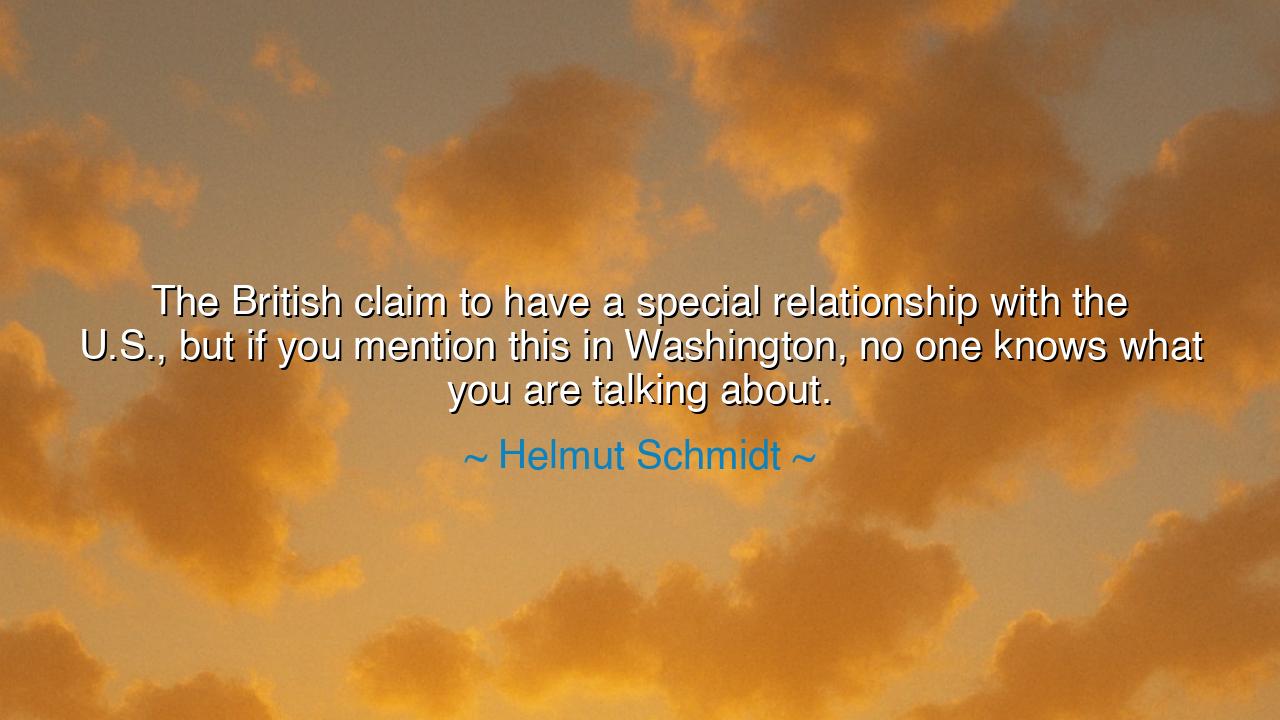
The British claim to have a special relationship with the U.S.
The British claim to have a special relationship with the U.S., but if you mention this in Washington, no one knows what you are talking about.






The German statesman Helmut Schmidt once declared with wry clarity: “The British claim to have a special relationship with the U.S., but if you mention this in Washington, no one knows what you are talking about.” In these words he unmasks the illusions of diplomacy, showing how nations may weave myths of relationship to flatter themselves, while the supposed partner remains unaware or indifferent. What one proclaims as sacred alliance, the other may see as ordinary necessity.
For the British have long spoken of their special relationship with America, born of shared wars, common tongue, and kindred traditions. To them, it is a bond unique, noble, and enduring. Yet Schmidt reminds us that such visions are not always mirrored. In the halls of Washington, the phrase holds no hallowed meaning, for America, vast and powerful, views alliances not through sentiment but through shifting interests. Thus, the relationship is special only in the eyes of one.
This saying reveals the danger of self-deception in politics. To believe one holds a privileged bond when the other does not confess the same is to build strategy upon sand. Nations, like men, must discern between affection and convenience, between true loyalty and fleeting alliance. When pride blinds the eye, disappointment will surely follow, for the heart has invested where the mind should have judged.
Schmidt’s words also carry a deeper wisdom: that all relationships, whether between nations or between souls, must be mutual to be real. A bond proclaimed on one side alone is but shadow, not substance. The truth of loyalty is proven not in words spoken in London or Berlin, but in deeds chosen in Washington, Moscow, or any seat of power.
So let this teaching endure: beware of flattering myths, whether in diplomacy or in love. A special relationship cannot be willed by one—it must be recognized by both. Build not upon illusion, but upon truth, for only then will the alliance endure. And remember always that the wise measure the strength of bonds not by sentiment, but by the steadfastness of deeds.






UGUser Google
Schmidt’s perspective is quite revealing. It seems to imply that the UK’s special relationship with the U.S. might be more of a myth or a diplomatic convenience. What do you think—does the U.K. truly have a special relationship with the U.S., or has that bond been overstated for political or historical reasons?
BNBao Ngoc
It’s interesting how Schmidt challenges the idea of the 'special relationship' between the UK and the U.S. with this quote. Could it be that the idea of a 'special relationship' is more of a historical concept that no longer carries weight in today’s political landscape? How does the reality of such relationships compare to the narratives countries promote?
NADo Nguyen Anh
Helmut Schmidt's comment about the special relationship between the UK and the U.S. sheds light on how international relations can sometimes be more about perception than substance. Do you think it's important for international relationships to be publicly recognized, or is it enough that they function behind the scenes?
CNChau Ngoc
Schmidt’s quote makes me think about how national narratives don’t always align with the reality on the ground. If the British claim a special relationship, but the U.S. doesn’t recognize it, does that undermine the idea, or is it simply a case of differing priorities? How important is it for countries to openly acknowledge their alliances for them to be meaningful?
NDNGUYEN NGOC DIEP
Helmut Schmidt's comment about the British 'special relationship' with the U.S. is quite intriguing. It highlights how political narratives can sometimes differ from reality. Do you think that the concept of a 'special relationship' is more of a British perception than a true diplomatic reality? Or is there an unspoken bond that simply isn’t acknowledged in Washington?